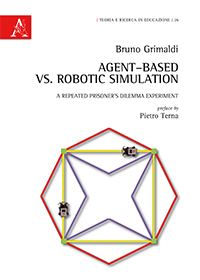Agent–Based vs. Robotic Simulation
A Repeated Prisoner’s Dilemma Experiment
Area 13 – Scienze economiche e statistiche
Tweet
SINTESI
At present, simulation models are a very important tool for researchers and decision-makers. This project aimed at analyzing and comparing two different kinds of methodology, namely a virtual and a robotic agent-based simulation. Can the real-world uncertainty and imprecision help the cause of modelers? What is the added value of engaging in a robotic simulation experiment? The analysis of the two methodologies has been carried out through a side-by-side creation and confrontation of a virtual and a robotic simulation model centered around the Prisoner’s Dilemma. The real-world model consists of two robots (Lego Mindstorm NXT) that meet each other repeatedly facing the decision to either cooperate or defect. The environment has been structured in such a way that their choices entail consequences in terms of distance to travel. The same model has been created in a virtual environment with NetLogo (video http://youtu.be/Elqs5xDu6ZI). The confrontation of the two simulations, showed that the physical simulation was able to give us many insights on aspects otherwise neglected. It allowed us to better calibrate the virtual model to the real environment by highlighting errors of analogy. Furthermore, the imprecision of real world led us to some key insight about the Prisoner’s Dilemma as well. Moreover, the educational aspect of engaging in a physical simulation should not be underestimated. Programming robotic agents allows to obtain real feedbacks, without layers of abstraction to obfuscate the dynamics of the interactions between the agents and the “world”. We can state that the robotic simulation provides a valuable contribution to the virtual simulation under several aspects and in our case offers another important perspective on the Prisoner’s Dilemma.
| pagine: | 232 |
| formato: | 17 x 24 |
| ISBN: | 978-88-548-7541-8 |
| data pubblicazione: | Settembre 2014 |
| marchio editoriale: | Aracne |
| collana: | Teoria e ricerca in educazione | 26 |

SINTESI













